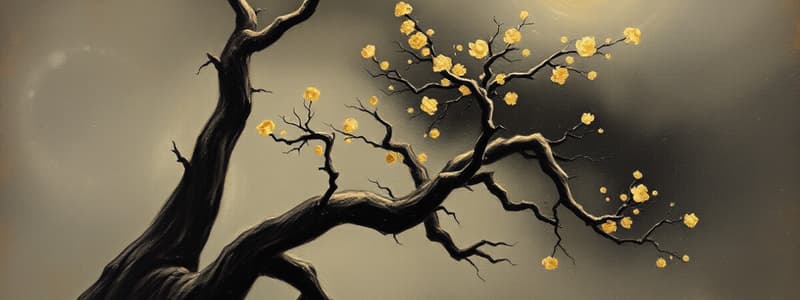Podcast
Questions and Answers
What genre of philosophy emphasizes precision of form and rationality?
What genre of philosophy emphasizes precision of form and rationality?
- Platonism
- Humanism
- Classicism (correct)
- Neoclassicism
What was the heart of the Renaissance in the 16th century?
What was the heart of the Renaissance in the 16th century?
Humanism
Which philosopher argued that the universe is divided into two realms of existence?
Which philosopher argued that the universe is divided into two realms of existence?
Plato
What philosophical system combined Platonic thought with Christian symbolism during the Renaissance?
What philosophical system combined Platonic thought with Christian symbolism during the Renaissance?
Which term describes the revival of classical taste and style during the 17th and 18th centuries?
Which term describes the revival of classical taste and style during the 17th and 18th centuries?
What reaction against rationality characterized sentimental novels and poetry in the later 18th century?
What reaction against rationality characterized sentimental novels and poetry in the later 18th century?
The emphasis on subjective impressions in writing during the late 19th to early 20th century is known as ______.
The emphasis on subjective impressions in writing during the late 19th to early 20th century is known as ______.
Flashcards are hidden until you start studying
Study Notes
Classicism
- Emphasizes precision of form and rationality, rejecting ambiguity and emotion.
- Highlights the importance of classical antiquity, specifically Greek and Roman works.
- Influenced by Aristotle's unities of time, place, and action in drama.
- Prominent during the Enlightenment and Age of Reason, leading to Neoclassicism.
- Ideals include simplicity, directness, order, clarity, decorum, balance, unity, and reason.
- Reflected in 18th-century works by authors like Voltaire, Addison, Swift, and Pope.
Humanism
- Central to the Renaissance in the 16th century, emphasizing the value of human potential.
- Originates from studies in grammar, poetry, moral philosophy, rhetoric, and history.
- Reveres ancient Greek and Roman literature, which shapes modern thought.
- Giovanni Boccaccio's "The Decameron" serves as an example; Petrarch is viewed as the first humanist.
- Economic growth in Italian city-states facilitated cultural development and leisure for education.
Platonism
- Based on the philosophy of Plato in the 4th century BC, distinguishing two realms: the perceptible and the intelligible.
- Believes the physical world is an imperfect imitation of a higher reality.
- Literature is considered a secondary imitation of the physical, thus further removed from truth.
- Core doctrine focuses on the concept of ideas and the soul's role in obtaining knowledge.
Neoplatonism
- Emerges from the 14th to 17th century, blending Platonic philosophy with Christian and Jewish mystical traditions.
- Concepts of spiritual love emerged, fostering a connection to God distinct from physical love.
- Key figures include Plotinus, with notable examples found in the works of Spenser and Sir Philip Sidney.
- Unified concept of reality divided into three levels: non-being, being (intellect), and beyond being (The One, The Good).
- Promotes the idea of returning to God through reason, aligning with Christian philosophy.
Neoclassicism
- A revival of classical taste and style during the 17th to 18th centuries.
- Characterizes French and English literature with a focus on formal and structured works.
- Notable authors include Racine, Voltaire (e.g., "Candide"), Addison, Swift (e.g., "Gulliver's Travels"), and Pope (e.g., "Rape of the Lock").
- Emphasizes reason and rationality over emotion, often employing satire to critique humanity.
- Presented as an opposition to the subsequent Romantic movement.
Sentimentalism
- Develops in the later 18th century as a counter to the rationality of the Augustan age and Calvinism.
- Focuses on evoking emotions, reflecting a more positive view of human nature.
- Often features tender or distressing scenes that advance emotional narrative rather than actions.
- Prominent authors include Jane Austen, Rousseau, and Charlotte Bronte.
Impressionism
- Arises in the late 19th to early 20th centuries, highlighting subjective impressions of reality.
- Focuses on personal perspectives and emotional responses to experiences and environments.
Studying That Suits You
Use AI to generate personalized quizzes and flashcards to suit your learning preferences.




